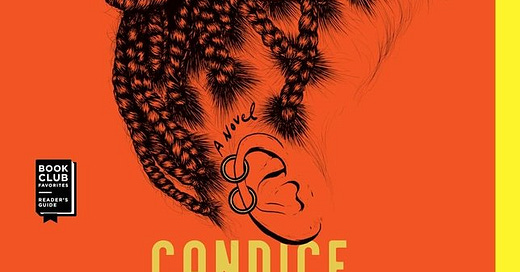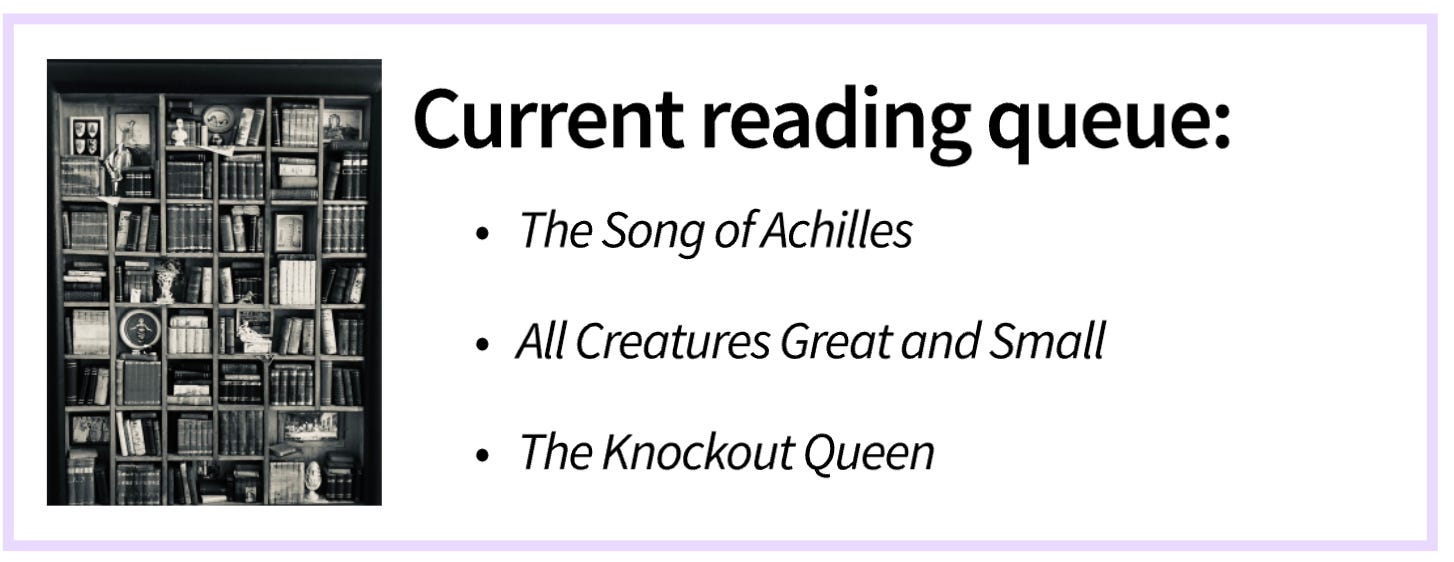If you are above a certain age and, likely, a woman, you couldn’t escape Bridget Jones’s Diary (published in 1996) and honestly, it would have been a touch curmudgeonly to have wanted to. It was a deliciously fun read with a distinctive voice - that always helps sell a bajillion books - but on a deeper level, I think it took off because it captured a certain kind of woman’s mindset at a time in her life when the pressures and anxiety of career, marriage, possible children, social life, body image, etc all coalesce. A lot of people could relate, even if they weren’t a British thirtysomething because it felt like a commentary on what it meant to be a modern woman at that time. (It also spawned a million genre copycats, many of which I enjoyed, sue me.)
I bring this up because before I read it it, I saw the novel Queenie described variously as a “modern day Bridget Jones”, “a Black Bridget Jones,” and “Bridget Jones meets Americanah.” Sounds like the perfect light read, right? Mais non, fair reader, mais non - this is no breezy, funny look at modern womanhood. I initially felt a little duped.
With the luxury of time and reflection, I now think the comparison is appropriate - but basically in none of the ways you (I) might initially think.
ARE YOU CURIOUS YET? Let me explain.
On paper, Queenie *feels* like it has a lot in common with Bridget Jones - it’s about a twentysomething young woman in London, working in news publishing, coming off a bad breakup, making questionable choices while she’s grappling with the anxiety and pressure of trying to find her footing and self-worth. There’s a charming cast of supporting characters, especially her friend Kyazike. It’s smart and engaging and occasionally quite funny.
And it’s modern and millennial in that Queenie is a Jamaican British woman, over-qualified and under-promoted, dealing with the anxiety that comes with being a twentysomething in today’s world. So I get why the book might be marketed this way.
But in my opinion, it’s emphatically not a modern-day Bridget-esque romp, because Queenie is much less playful, much more clear-eyed about the world, tackling miscarriage, modern dating and casual sex, racism, immigrant family dynamics, depression and mental health, just to name a few upbeat topics. Queenie’s downward spiral isn’t played for laughs - it’s real and upsetting, and in many ways your heart breaks for her as it never did for Bridget because you knew there was a happy ending in store for Bridget.
Where Bridget Jones was a bit slapstick, Queenie is sad. Where Bridget wants a winking bit of a snog and her Prince Charming, Queenie engages in grotty, app-driven sex in exchange for intimacy. Where Bridget’s humor and pathos come from showing that she (and we) are all a little bit of a mess but lovable anyway, Queenie is really about showing that the world is a bit of a mess, and we are lovable but fragile humans messily trying to negotiate our way through it. Queenie reminds you that there may be positive outcomes and good events, but the fairy tale is just that - it’s not real life, and there’s no neat resolution.
And that is where I think Queenie (and similar recent reads like Luster, Such a Fun Age, even Nothing to See Here) both embody the millennial Bridget Jones title and also blow it up - because she embodies what it seems to mean to be a young adult today, which is both hopeful and kind of depressing. Young women (and I assume men) are trying to impossibly make ends meet through multiple low-paying jobs, to find suitable housing and healthcare, to address mental health, to grapple with deep racial and economic inequality and impending climate doom, to maybe find a mate in the “wanna meet up” age of Tinder and pervasive free pornography. It’s no glitter picnic! In the same way we snicker about Sex and the City (“HOW did a freelance writer afford her lifestyle”) and Friends (“HOW did they afford that apartment and WHY was there exactly one Black person in New York City?”) , times have changed and these books show you how.
Soooooo … am I recommending Queenie? Ultimately yes - but for all the things she is and that the book represents, not for all the comparisons you’re being sold in the marketing campaign.
We Need to Talk
In the coming weeks, your girl will be experimenting with sending this on Friday morning (along with some updated branding), so keep an eye out for this new timing! And in the extraordinarily unlikely event that you have a preference on when this email gets sent to you, I’m all ears.
After a few days of travel, I’m further convinced that a/I’m not yet ready for crowds and b/I’m sorry, my noble e-reader is simply fathoms worse than physical books. Tell me - are you team Kindle or team Paper?
And as always: these links go to Bookshop.org, which supports independent bookstores in countries you know and love like the US, UK, and Spain. You can see all my past recos here or even pre-order the new Amor Towles because obviously we’ll need to discuss it.





